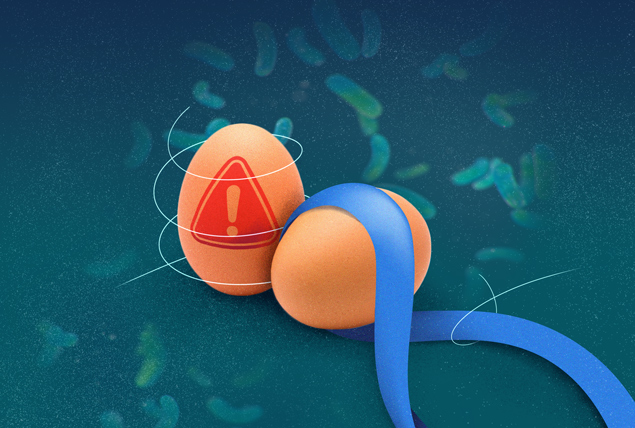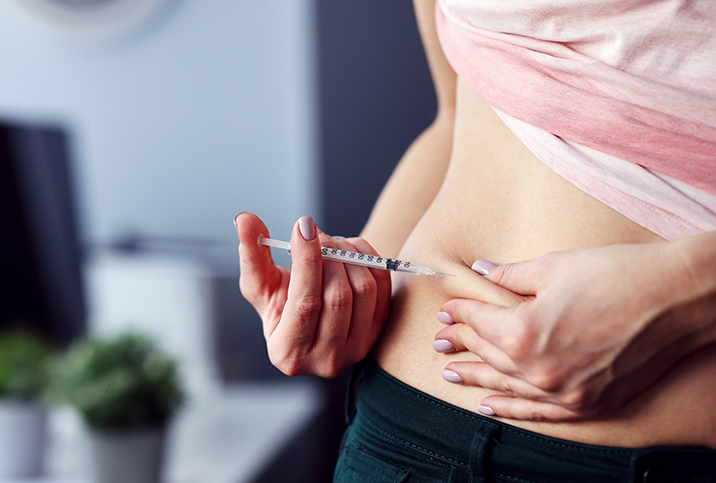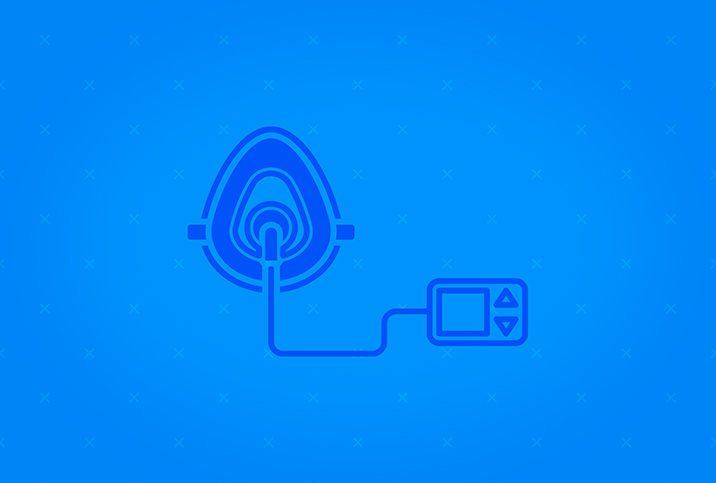Be on the Lookout for These Signs and Symptoms of Diabetes

Diabetes is a chronic health condition that occurs when your blood sugar (glucose) is too high. Glucose—the body's primary energy source—comes from the foods we eat. When your glucose increases, the pancreas gets a signal to release insulin, and that insulin allows the blood sugar to reach cells for use as energy.
People with diabetes either do not produce enough insulin or cannot use it properly and efficiently. When there is a lack of insulin or the cells stop responding to it, too much glucose stays in your bloodstream. This can lead to severe long-term health problems, such as heart disease, vision loss and kidney disease.
The three main types of diabetes are type 1, type 2, and gestational diabetes (diabetes during pregnancy). People with type 1 diabetes do not manufacture insulin, but that condition can be controlled with the aid of insulin therapy and other medications.
The most prevalent type of diabetes is type 2, which occurs when the body improperly uses insulin. Some people with type 2 diabetes require insulin or medication, while others may manage their blood sugar levels with a nutritious diet and an active lifestyle.
Poorly controlled diabetes can lead to sexual problems. High blood sugar can affect the nerves and blood vessels, including the vessels that supply blood to the penis or vagina. This diminished blood flow into sexual organs can lead to loss of sensation in the genitals, which can make it more difficult to become physically and mentally aroused.
Diabetes can cause erectile dysfunction (ED) in men. Women with diabetes are at a greater risk of urinary tract infections (UTIs), yeast infections and vaginal dryness.
While not everyone with diabetes experiences sexual dysfunction, it's important to know how to reduce your risk of developing these issues and how to manage them.
Common signs and symptoms of diabetes
People with type 1 diabetes may experience vomiting, nausea or stomach aches. Symptoms may develop in a few weeks or months and can be severe. Type 1 diabetes typically begins during childhood or young adulthood, but it can emerge at any age.
Symptoms of type 2 diabetes typically take years to show. Some individuals don't experience symptoms at all. In most cases, type 2 diabetes begins during adulthood, although more children are developing it. Symptoms are difficult to identify, so it's vital to understand the risk factors.
Gestational diabetes typically doesn't present with any symptoms. Pregnant women should get tested for diabetes between 24 and 28 weeks of pregnancy.
Common symptoms of diabetes include the following:
- Frequent urination
- Increased thirst or hunger
- Feelings of tiredness and lethargy
- Cuts that are slow to heal
- Blurry vision
- Itchy skin or skin infections
- Unexplained weight loss
- Tingling, pain or numbness in the hands and feet
Diagnosis and tests
Diabetes is diagnosed when blood sugar (glucose) surpasses a certain level. The best measure of that is the hemoglobin A1C (HbA1C) test, a blood test that indicates the average glucose level over a period of three months. This test, which does not require fasting beforehand, measures the amount of glucose attached to hemoglobin, the protein in red blood cells that transports oxygen.
An A1C value above 6.5 is considered a positive diagnosis of diabetes.
"It's a measure of how much sugar is encrusting a blood cell, which turns out to be a really good, solid, accurate measure of what your long-term glucose is," said Marshall J. Bouldin, M.D., the chief medical officer, vice chairman and co-founder of Vigilant Health in Ridgeland, Mississippi. "It's really hard for it to be wrong. A1Cs don't lie, and that's how you make the diagnosis."
Diabetes does not suddenly happen. A patient becomes prediabetic at a 5.7 A1C value, which occurs five to 10 years beforehand, Bouldin said. Below 5.7 is considered normal.
"If you don't get off that path of gaining weight and eating unhealthily, you will reach the day where you will become diabetic," he explained. "It's a thing that people can know ahead of time and know the path they're on and know to get off of it."
While the A1C test is the most common and definitive one, there are several other tests for diabetes, including the fasting blood sugar test, oral glucose tolerance test and random blood sugar test.
When and where to seek help
You should seek help if you are experiencing symptoms of diabetes. Types 1 and 2 diabetes have many early symptoms, but they are not always specific. If you have risk factors for diabetes or someone in your immediate family has the disease, it is important to get your blood sugar level checked. The sooner you address the symptoms, the less likely it is that you will develop the complications.
A good care team is critical to staying healthy when you have diabetes. A diabetes specialist is called an endocrinologist, someone who specializes in the glands of the endocrine system. They often work as a team with other diabetes specialists, which may include dietitians, nurse practitioners, pharmacists and exercise physiologists. This team helps you handle all aspects of diabetes management.
What can happen if diabetes goes undiagnosed?
Undiagnosed and untreated type 1 or type 2 diabetes can lead to long-term complications or even death.
Untreated diabetes can lead to diabetic ketoacidosis, a serious condition that can be fatal. This happens when people with diabetes cannot use their blood sugar for energy.
Normally, the body's cells burn sugar for energy, but to obtain that sugar from the blood, they need insulin signals. Without insulin, people with diabetes must burn fat for energy, which produces dangerous levels of molecules called ketones.
Untreated diabetes can lead to nerve damage, kidney problems, and heart and blood vessel problems.
"[Diabetes] is the root to so much disease," Bouldin said. "It's a major cause of blindness in the United States. It's a major cause of losing a limb from amputation. It causes heart disease, heart attacks and strokes. It's the leading cause of kidney disease."
Untreated or poorly controlled diabetes is also associated with nerve damage in the legs and feet, gum disease, hearing loss and skin infections. This is caused by vascular disease and the agency of glucose, which is toxic and causes blood vessels to clot.
"That's basically what causes a great deal of the woe of diabetes," Bouldin said.
If you have diabetes, you are twice as likely to have hypertension (high blood pressure). Untreated hypertension can raise your risk for cardiovascular disease.
"Unfortunately, obesity drives hypertension in the same manner it drives diabetes," Bouldin explained. "It's directly, linearly correlated with weight. That causes a whole different pathology that causes damage to organs, primarily through the vasculature. So they multiply themselves."
In America, 90 percent of the time someone is overweight, they are hypertensive, too, and that is the second-leading cause of dialysis, he added.
"It's like double-whammy stuff that just comes down on producing all these bad outcomes," Bouldin said. "The third one that goes with weight is cholesterol patterns that cause vascular disease. All those things go together to produce this metabolic syndrome."
By controlling diabetes, you increase the chances of avoiding heart disease, stroke and other diseases.
Myths and misconceptions surrounding diabetes
Many myths and misconceptions surround diabetes. Five of the most common are debunked here:
Myth #1: I have diabetes, so I have to be on insulin
"That's just not true," Bouldin said. "You don't have to be on insulin. You've got all this control. Once you know you have diabetes, there are so many medicines that are non-insulin that we can take."
Myth #2: I have diabetes, so I'll end up on dialysis
You will not have complications, including being put on dialysis, a treatment for failing kidneys, if you keep your diabetes under control.
"We can do all these things for you to keep you from having high sugar, which keeps you from having all these complications," Bouldin explained.
Myth #3: I'm overweight, so I'm going to develop diabetes
While it is true that being overweight increases your chance of having diabetes, it's not a foregone conclusion. Many men and women who are overweight never develop diabetes. And some people who are at a healthy weight develop diabetes.
Still, it's best to practice healthy eating and regular exercise so you lose excess weight and minimize your risk.
Myth #4: My parents and siblings don't have diabetes, so I won't get it
Having family members with diabetes does increase your risk for getting both type 1 and type 2 diabetes. However, millions of people with diabetes have no close family members with the disease.
Myth #5: I'm going to develop diabetes because I eat a lot of sugar
Consuming sugar does not cause diabetes. However, you should reduce your intake of sweets and sugary sodas because they can contribute to weight gain, which may put you at risk for developing type 2 diabetes.














